'I Feel It in My Chest': Photographer Mel D. Cole Describes the Mental Toll of Documenting This Moment
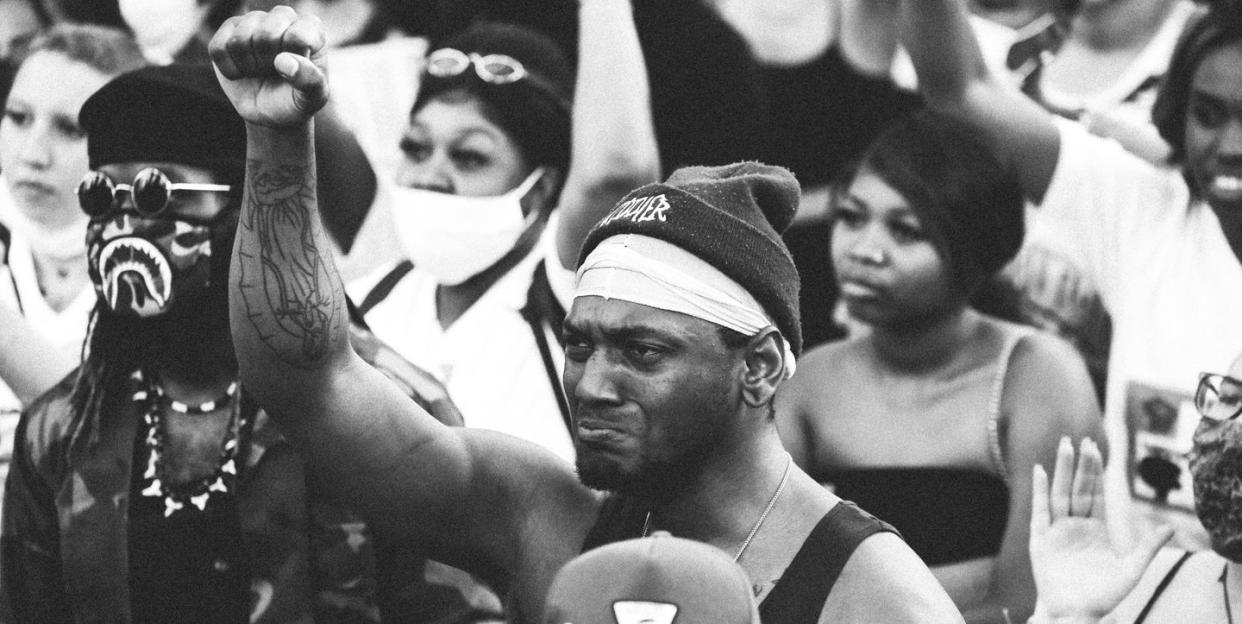
When Mel D. Cole is out shooting photographs of Black Lives Matter protests in New York and New Jersey, he carries four images in his head. One is the unidentified man standing in front of the tanks in Tiananmen Square. One is the killing of students at Kent State by the Ohio National Guard. The third is Martin Luther King, Jr., marching arm-in-arm with other religious leaders. The last is the one he thinks about the most, a Time magazine cover of the Baltimore uprisings in 2015, after cops killed Freddie Gray. Cole says that together, these images form "a collective memory." He hopes the photographs he's taking now might have a similar impact in protest photography.
Cole is known for photographing the hip hop scene; last year, he published a collection called GREAT, which features Tyler the Creator crowd-surfing on the cover and 17 years of concert photos, behind-the-scenes candids, and artist portraits splashed across atlas-sized pages. Music is what got Cole into photography, and when the country is safe again, he says he'll be in the crowds at the first big concert, adding more images to his already-extensive library. But he's always been drawn to conflict, he says, and right now "is one of the biggest conflicts ever."
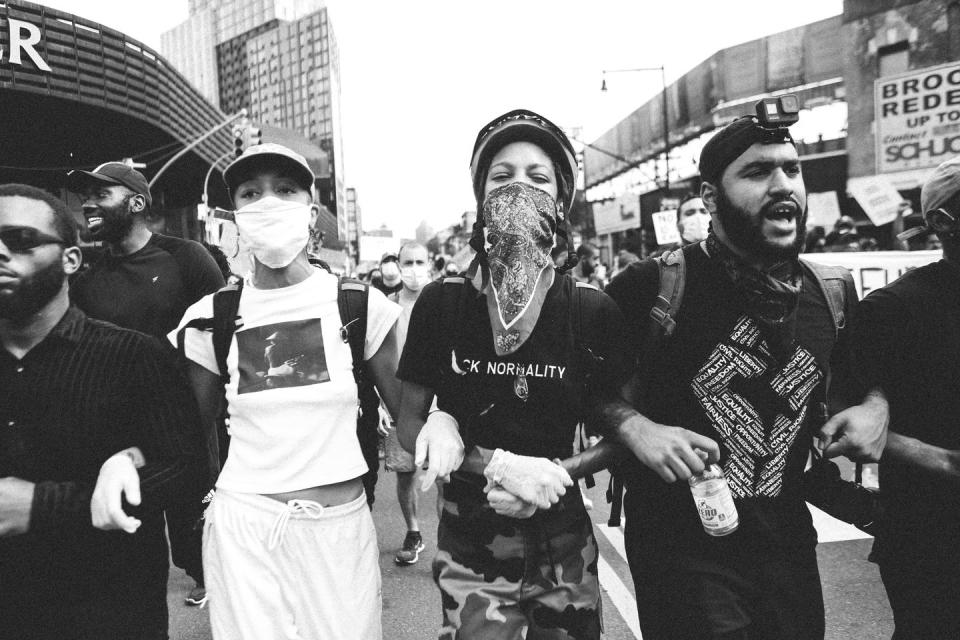
Cole photographed his first protest, a march in New York City for Ferguson, in 2014. This is his second go-round with protest photography, and it's taken him through the streets, capturing the faces and emotions of the 2020 movement. On one night in New York, it took him into a store being looted, where an incident with cops caught on camera caused an outcry. Last week, he was in Houston photographing the funeral for George Floyd. He says he's gained ten thousand followers in a matter of a week.
Late last week, Esquire spoke with Cole about the run-in with the cops, the history of protest photography, and the importance of Black photographers documenting this moment. The images were taken by Cole in New York City and Jersey City in late May and early June.
This interview has been edited and condensed for clarity.
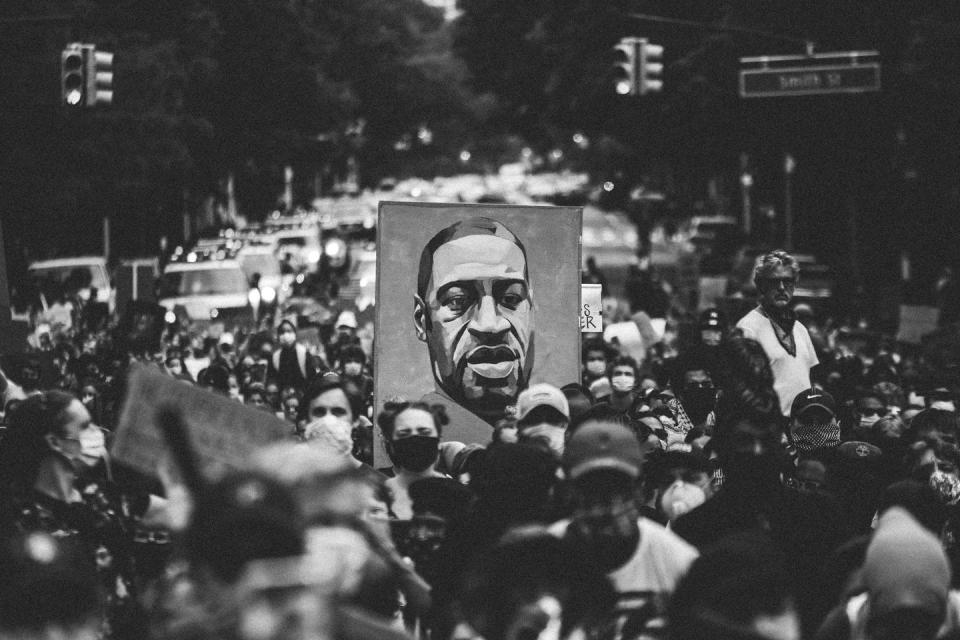
ESQ: Are your photographs from that Ferguson protest in 2014 different than what you're shooting now?
MDC: It's much more powerful now. This is just totally, totally, totally, different, even though the themes are pretty much exactly the same, with police brutality and indict the system and stop racist cops. I was emotionally connected [in 2014] being a Black man, but this one I just feel like is literally in my face. I feel it in my chest, I feel it in my heart, I feel it everywhere. It's on top of me. It's something that I can't escape. That's why I dedicated myself to covering what's been going on.
ESQ: I've seen a video pulled from your Instagram stories that showed you getting harassed by the cops inside a store. Why were they harassing you?
MDC: Well, I know why they were harassing me. I was in the store, and I'm assuming that they assumed that I was one of the looters. But it's very obvious that you could tell that I was not a looter—other than the color of my skin, in my opinion. When they came into the store, my hands were up. You can hear in the video that I am clearly telling them that I am a photographer. You can clearly see me with a GoPro on the top of my head, a camera around my neck, and a camera around my shoulder. I don't know how much more evidence you need to see that I'm a photographer. I got hit a couple of times, but there was no real damage done to me except for a little mental abuse. Physically, I'm fine. Mentally, it's something that will stay with me for a while.
Mel out here giving me a heart attack man 😞 @meldcole
A post shared by Questlove Froman, (@questlove) on Jun 1, 2020 at 10:29pm PDT
A lot of people will ask and have asked and continue to ask, "Why did I go into the store?"—say that I'm stupid for doing it or whatever. And my answer is I took a risk, and it wasn't the most calculated risk. Would I do it again? Absolutely not. Do I want to get beat by the cops again? No, I don't. But I wanted to document from a different perspective. I wanted to see something that I couldn't see from outside the store. Putting on my photojournalism hat, so to speak, I always thought about the photographers that are on the front lines in different conflicts, and I feel like when you're out there, you put yourself in harm's way to get the story, and that's what I did.
ESQ: What was it like to look back at that video from that incident?
MDC: It's hard for me to watch it. My friend Questlove from the Roots posted it on his Instagram, and I started getting all these people basically saying, "What the fuck happened, oh my god." Quest texted me like, "Yo, are you all right? Do you need anything? I've been seeing this happen to a lot of people." He was asking me if there was a GoFundMe for other people in media like me who had this happen. There was this outpouring of outcry and support.
I heard this quote the other day: There's three different types of people that were out that day. There were peaceful protestors, and then there were people that are mad—they might want to burn some shit down—and then there is the looters who actually have nothing. They looked at this shit like, "Fuck it, this is going on, let's go do this." I'm not sure if I completely agree with it, but I can see where whoever made the quote was coming from. It’s the redistribution of property. People want what they can't have, and if they can't get it, they're gonna get it. As a human being collective, we have to look at the reasons why we—and by we I'm saying Black people—don't have, and why we are willing to put our lives at risk to get.
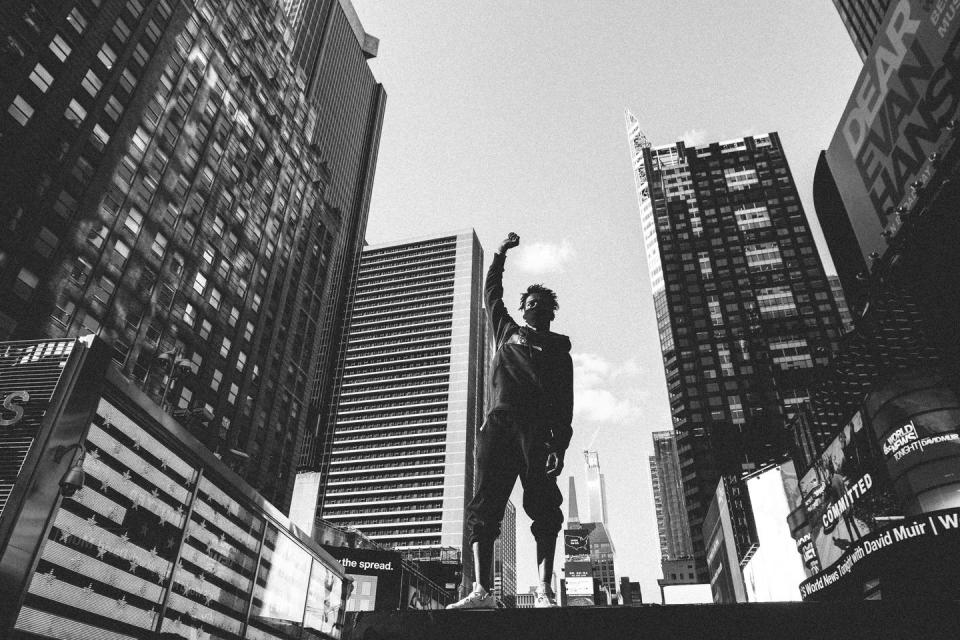
ESQ: Does your being in that situation give you more clarity on this redistribution of property?
MDC: I'll be 44 in August. I have a kid, I have a family, I'm trying to live longer. When I was 20, I didn't think I would make it to 21. The people who were looting, if I had to try to get into their mindset, it's like they don’t give a fuck. They've been to jail before. They've done the dirty deeds. They're just tired of what the fuck is going on and what the fuck is happening in the world, and they want. And they got it. They broke into the Leica store in Soho and stole almost a half million dollars worth of camera equipment, and I can't say when I was 20 that I would not have been right there with them. But there's no excuse.
ESQ: What in your previous work prepared you to document the protests?
MDC: Everything. I've been documenting for almost 20 years now, and my style has always been raw in capturing things in the moment. I guess I'm not necessarily the Jonathan Mannion of the hip hop world. I am more of a fly-on-the-wall, documentary-style kind of guy. I'll take a photo of you in the street and maybe use the sky, and you might think it's in a studio somewhere. I want to capture people doing what they're doing, capturing emotions in the same way I capture emotions during a concert. But also, what I'm looking for is to create a piece of art, to create something so powerful that it moves and shakes the earth.
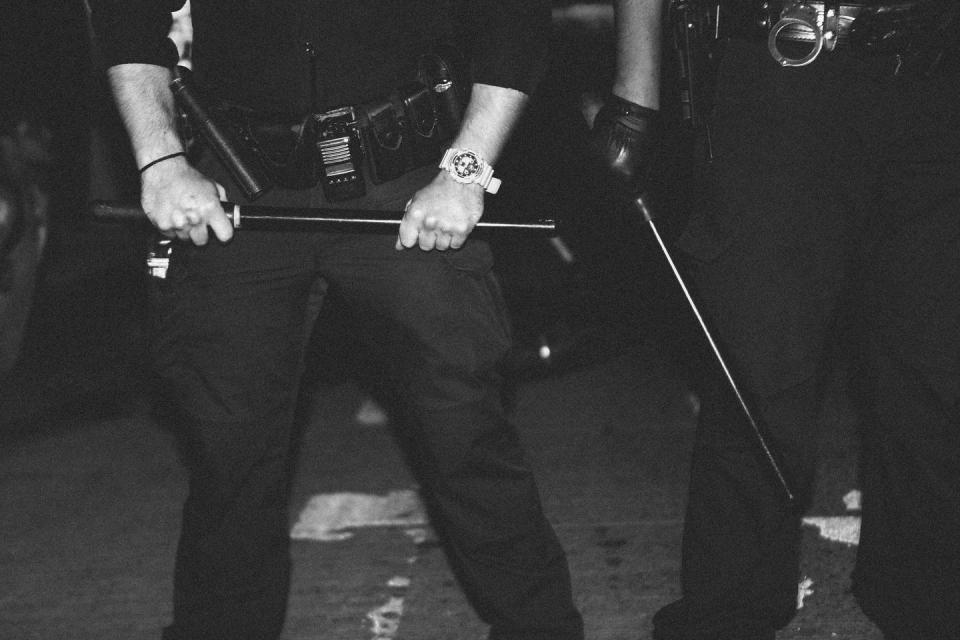
ESQ: Is there anything that you weren't prepared for?
MDC: Shit yeah. I saw three police vans get firebombed—I was not prepared for that. Just watching people pose in front of fucking vans and burning garbage cans, it's scary. I'm like fuck, I want this shot, but I am not about to risk my life and get up so close with you.
ESQ: Photographers are very much becoming the story right now. Is this something that feels important to you?
MDC: I feel that it's super important especially for Black photographers that we get to tell our own story, and we get to tell it in a way that only we can tell it. There's a photographer, Devin Allen, who just got his second cover of Time magazine, and that cover is just as much about protest for me and what's going on as it is about him. That is a proud moment for him, it's a proud moment for me, it's a proud moment for Black people all over the world. It's the cover of Time magazine. That in itself is such a prestigious achievement, in Black photography history and Black history, in protest history, to know that these publications are looking at us. Me being able to talk to you, a magazine that I read and still read, is a huge accomplishment.
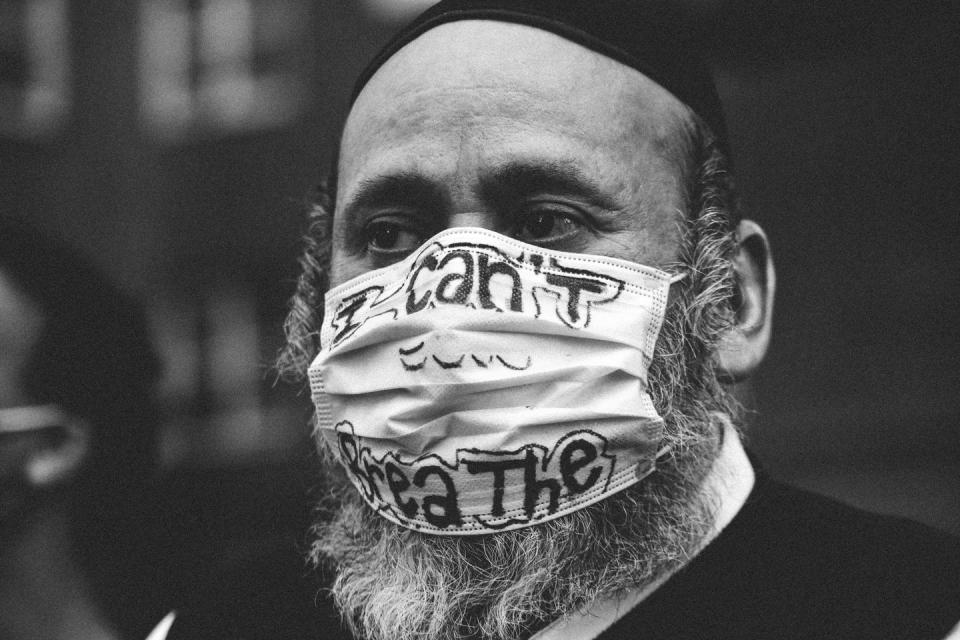
ESQ: Speaking of history, are there any protest images from American history that you have been thinking about lately?
MDC: There's the Time magazine cover from 2015 where a man is running, and in the back there's cops, and [the year 1968] is crossed out. It's a photo by Devin, and for me, that is like one of the ultimate modern-day protest, uprising, movement photos. To me, that photo should be in every museum. It should be everywhere. When the history books talk about what's happening over the last 10 years, that photo should be talked about. And I hope for me, for what I'm doing, that I'm able have a photo just as powerful as that one.
ESQ: Is there a reason you chose to make the majority of the images you've posted black and white?
MDC: When I look at protest photos and I look at uprisings and I look at civil rights movement, they're in black and white. It's a continuation of the legacy of what these other photographers were doing, the continuation of the legacy of the times. And also, the basic answer is just I really, really love black and white photos.
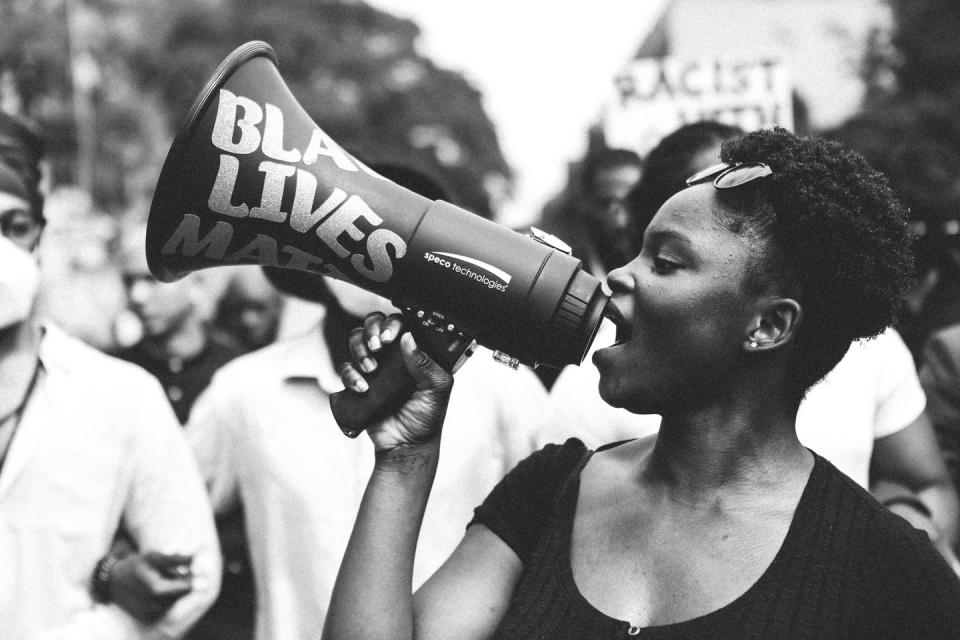
ESQ: There's been discussion with a lot of the images that are being used right now about showing peaceful demonstrations versus violent demonstrations, showing faces, not showing faces—is this something that you've thought about?
MDC: I have an Instagram Live show, and Devin was one of my guests on the show weeks ago, and he said, “I wanted to tell the complete story. I didn't want to just show us getting fucked. I didn't want to just show the cops beating people. I want to show everything." So when it was my time to step up to the plate here in New York, I really took that to heart, and I wanted to make sure that I showed everything, from looting, from cops just standing still not doing anything, from cops in action, from people getting arrested. And I've gotten a little shit from it. People are like, you shouldn't show this, they could get arrested. I feel like I'm documenting. I'm showing what's going on to the world, and I feel like when you're a photojournalist, that's your job.
ESQ: Of the photos that you've chosen to put on your Instagram, what about those subjects stood out to you? What have you learned from them?
MDC: I've learned that everyone is out here for something different, but we all want the same thing. We all want to be treated equally. We want the same rights as everyone else, and when I say “everyone else,” I mean white people. We want to be looked at the same. We want to be treated the same by the police. Don't call the cops on us because we want to look at birds and we don't want your dog running around to ruin it. We just want equal rights. When I post photos of people, I see that in their eyes. I'm so proud of the world right now, but also, as proud as I am, I'm more disappointed in the world. There's so much racism going on in the world that for some people in some countries, they can't speak up like we can here. And even though we're speaking up here, we're still getting beat down.
You Might Also Like

